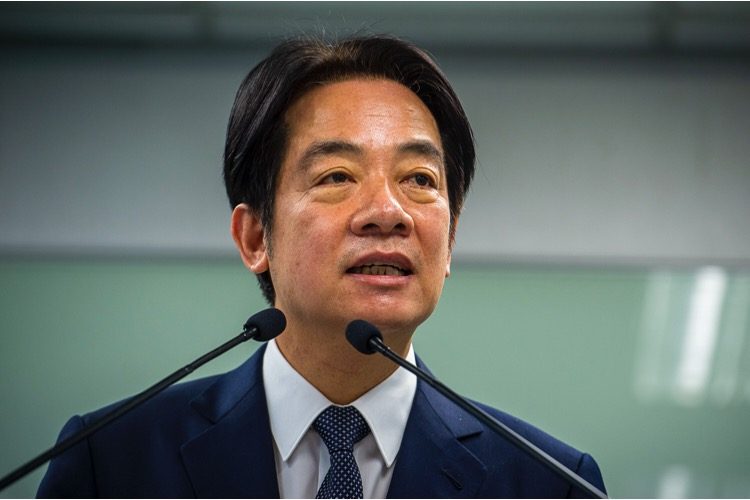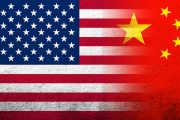
SINGAPORE — Taiwan’s leading presidential candidate Lai Ching-te has chosen the self-governing island’s high-profile envoy to the United States as his vice-presidential running mate, further portraying the electoral race as a competition between pro-U.S. and pro-China interests.
Lai, presently Taiwan’s vice president, has chosen Hsiao Bi-khim as his running mate, based on local and Western media reports released on November 16. Hsiao, characterized by Reuters as “a fluent English speaker with deep connections in Washington,” has served as Taipei’s envoy to the United States since 2020.
A recent poll by Taiwanese broadcaster TVBS depicted that Lai was dominating the presidential race, with backing from 33 percent of voters. His rivals, TPP candidate Ko Wen-je and the KMT’s Hou Yu-ih, were polling at 24 percent and 22 percent, respectively.
TVBS said a formal declaration regarding the selection of Hsiao as Lai’s running mate is scheduled to be made on November 20, the first day for official candidate registrations. At the moment, Hsiao is participating in the Asia-Pacific Economic Cooperation (APEC) summit in San Francisco, where U.S. President Joe Biden held a much-touted meeting with Chinese authoritarian leader Xi Jinping on November 15.
After the APEC summit, Hsiao will return to Taiwan for the presidential campaign. A spokesman for Lai’s campaign, Vincent Chao, refrained from verifying if Hsiao will join the DPP team. Without naming whom the chosen candidate would be, Chao informed Reuters that the running mate will “reinforce our commitment to the people of Taiwan and the international community that democracy, peace and prosperity will continue to be our guiding values.”
Erstwhile Pentagon official Randall Schriver hailed Hsiao as a good promoter of U.S.-Taiwan relations. “If ambassador Hsiao becomes vice president, there is no doubt this will be to the benefit of US-Taiwan relations,” he told Reuters.
Hsiao was born in Japan to a Taiwanese father and an American mother. She has long served as an international spokeswoman for the DPP. Beijing has twice enforced sanctions on Hsiao, labeling her a diehard separatist. China’s most recent sanctions on Hsiao came in April, banning her and her family members from traveling to the mainland, Hong Kong, or Macau.
These developments came a day after Taiwan’s leading opposition parties, the Kuomintang (KMT) and Taiwan People’s Party (TPP) respectively, agreed to form a joint ticket in January’s election to consolidate their political support and enhance their chances of defeating Lai’s Democratic Progressive Party (DPP). The result of the joint ticket will be announced on November 18, based on a joint statement published following a meeting between KMT candidate Hou Yu-ih and the TPP’s Ko Wen-je.
On November 15, both the KMT and the TPP agreed to settle on a single presidential candidate rather than divide the vote. Also, they also agreed to form a joint government if they emerge triumphant in the election.
“This is a historic moment for Taiwan, where two parties talk to form a coalition government,” TPP candidate Ko Wen-je admitted. “We need everyone to work together to work toward a final result.” The parties will introduce either Ko or the KMT’s Hou Yu-ih as the presidential candidate on their combined ticket after assessing polling data together. The runner-up would become the vice presidential running mate.
“A successful opposition alliance — no matter who is running as president — means it’s likely cross-strait tensions will improve, as the opposition has more than a 50% chance of beating the DPP’s Lai according to local polls,” National Taiwan University political science professor Wang Yeh-lih told Bloomberg News. “For China, either Ko or Hou taking the presidential seat will be better than Lai.”
The KMT and TPP have both pledged to pursue dialogue with Beijing to “restore peace and stability in the Taiwan Strait.” Chinese officials have decried the DPP’s Lai as a separatist and “troublemaker through and through.”
The recent KMT-TPP agreement came just a week or so before a November 24 registration deadline and after the two parties had bickered for weeks over which method would be best in determining whether Hou or Ko would lead a joint ticket.
Analysts believed that such a team-up would be the only way for the opposition — all seen as more mainland-friendly — to present a formidable challenge to the ruling independence-leaning DPP.
In turn, the DPP has condemned its rivals for being manipulated by the Chinese Communist Party (CCP) and of kowtowing to “the will of Beijing.”
Besides, analysts have also said that combining the opposition votes would put the DPP at greater risk of losing power, which would likely mean a less-hostile approach toward China in Taipei.
Meanwhile, the billionaire founder of Foxconn, Terry Gou, announced his candidacy as an independent in August. He had only eight percent support in the TVBS poll.
Gou, who failed to secure the KMT’s nomination, has hinted at an alliance with Ko. Taiwanese National Security Council chief Wellington Koo told reporters that a Chinese tax investigation of Foxconn was politically motivated because CCP officials did not want Gou to split the pro-Beijing vote.
January’s election will likely determine whether Taiwan can boost ties with Beijing, which has vowed to reunify with the breakaway province — by force, if necessary. The opposition KMT and TPP have both pledged to dialogue with the Beijing regime to “restore peace and stability in the Taiwan Strait.”
Beijing suspended diplomatic contact with Taipei after the DPP’s Tsai Ing-wen took office as president in 2016. Since Tsai assumed power in 2016, Beijing’s relations with Taiwan have taken a nosedive. Cross-strait tensions have increased in recent years, with the Beijing regime conducting large-scale military drills in the Taiwan Strait. Tsai, on her end, has hosted visits by U.S. politicians and increased arms purchases from Washington.
In his recent meeting with Biden in San Francisco this week, China’s Xi “underscored that this [Taiwan] was the biggest, most potentially dangerous issue in US-China relations, laid out clearly that, you know, their preference was for peaceful reunification but then moved immediately to conditions that the potential use of force could be utilized,” a senior U.S. official said, as reported by Reuters.
Although Beijing said that both Biden and Xi decided to restart military contacts that China severed after then House of Representatives Speaker Nancy Pelosi visited Taiwan in August last year, such statements by no means indicate that Xi has jettisoned his wish for the takeover of Taiwan.
For instance, Xi has already started a major purge of the People’s Liberation Army, or PLA for short, a move that has been likened by China critics to what communist dictator Joseph Stalin did in the USSR immediately before it entered into war with Germany.
Also, Tsai ‘s government has repeatedly cautioned against China’s attempts to influence public opinion on the self-governing island, which Beijing claims as its own territory despite Taipei’s strong opposition.
“They hope to influence Taiwanese people by reaching out to the grassroots,” one Taiwanese security official with direct knowledge of the matter told Reuters in June this year. “They hope to influence swing voters who don’t have particular political affiliation and would vote for whoever gives them benefits.”



